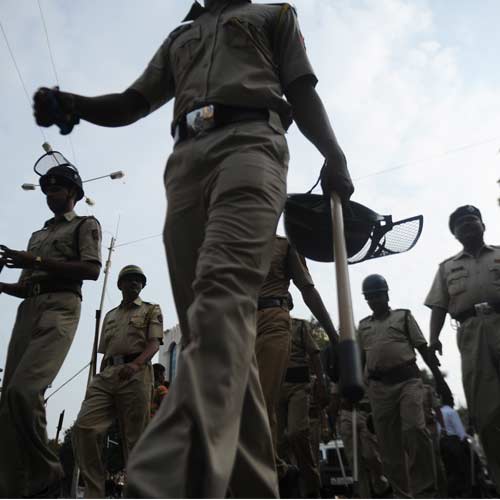Hardly in the spotlight for good reason, the Delhi Police’s Special Cell has been damned again in a new report that exhaustively investigates and details the cases of the many young men, mostly Muslim, detained by the agency on charges of terrorism only to be acquitted by court due to “fabricated” and “planted” evidence, procedural lapses and false cases. The Jamia Teachers’ Solidarity Association released the second edition of Framed, Damned, Acquitted, in New Delhi on Wednesday, where the organisation pointed out the blatant communal agenda of the police, which caused several young men to lose years of their lives; most of them from Kashmir, a few from the north eastern states.
The first edition of the report was released in 2012, with 16 cases documented. The new edition takes the cases up to 24, once again minutely examining court documents and judgments to show how exactly these trails in cases of terrorism accused fall apart under scrutiny.
Take for example, case number 22 of the report, State versus Md. Ameen Wani alias Khalid and Luthfur Rahman alias Haroon, in which the police claimed to have seized 1.5 kg of PETN, a highly explosive substance and stored it in their malkhana. The PETN was the crucial piece of evidence on which the accused guilt or innocence depended. When the court asked for it to be produced as evidence, the Special Cell replied that the malkhana had caught fire and in this fire, this material, one of the most powerful explosives known, had evaporated.
In case number 20, of Pervez Ahmed Radoo, a graduate in chemistry lost seven years to jail just when he was about to start his Ph.D. The police failed to present any mobile phone usage or call detail records during the time he was put under surveillance on the suspicion of being a Jaish-e-Mohammad member.
Witnesses for the prosecution have repeatedly failed to back up their stories under cross examination, with many later admitting the police made them sign blank sheets of paper, or that they had never seen the accused in the first place, as in case number 22, State versus Mohd. Iqbal and Mushtaq Ahmad Kallo.
When the first report came out in 2012, the police responded to the scathing attack on its competence and objectivity by saying that it was tough to prove guilt beyond reasonable doubt in such cases, public witnesses did not come forward, and still the rate of conviction was high. This report demolishes these claims, by using court documents that have time and again indicted the Special Cell, saying that any effort to enlist independent witnesses “was omitted by the police deliberately”
It also pointed out that rarely were convictions under charges of terrorism. Sentences handed out by sessions courts, even for the death penalty had been overthrown by higher courts, and convictions, if at all, happened under other laws pertaining to, say, the Explosives Substances Act.
Speaking at the release, Bombay based advocate Yug Mohit Chaudhary pointed out that this behaviour was not limited to Delhi. The Mumbai police ATS, too, behaved similarly with young Muslim men arrested for Malegaon blasts and the 2006 train blasts. In the latter case, the CDR was a crucial bit of evidence that the police refused to present, until the High Court ordered it. Then it claimed to have destroyed the data. Chaudhary also pointed out the systematic hunting down of these men, as two of the boys who had been let off for Malegaon case, were picked up against by the same officer for the train blasts.
Human rights activist Ravi Nair and legal scholar Upendra Baxi too denounced the “communal and politicised” nature of the police, as the panelists pointed out the insidious section 197 of the CrPc, that protect these policemen from prosecution.The Special Cell members have, therefore, been safe from the consequences of their punitive reign, while their victims, who leave prison after years of physical and psychological damage, often in dire financial condition have never even been offered compensation by the state.









1 Comments
Tara Nath Ghimire
Not all cases are fabricated or planted. They are real.